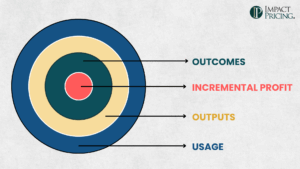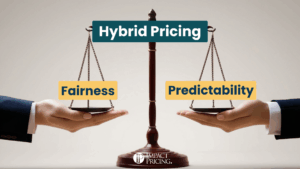You can listen to the full audio version of this blog we call — Blogcast.
I recently disagreed with some colleagues over the words “collusion” and “implicit collusion.” Here are my thoughts.
First, collusion is bad. Colluding on price is illegal and will get you sent to jail. Never, ever talk with your competitors about pricing. Just don’t do it!
But implicit collusion is different. It may sound bad, but it’s not. It’s the only way to make a decent profit in a competitive market.
Implicit collusion means you are watching your competitor’s actions, and you assume they are watching yours. You make your pricing decisions while considering how your competitor might respond.
As a quick example, you run a gas station and have complete control over your price at the pump. You have a competitor across the street. Currently, you are both charging the same price. Experience shows that you could lower your price by 2 cents, and 10% more customers would buy from you instead of your competitor. After the analysis, you realize this would be a very profitable decision. Should you do it?
I’d advise against it. What will your competitor do if you lower your price and steal some of their market share? Most likely, they will lower their price. If they lower it to equal your price, shares return to where they were, and you make less profit. In hindsight, that wasn’t a very good decision.
Instead, you are smart and hold your price high.
By the way, your competitor has to go through the exact same logic. If your competitor is smart, they don’t lower their price either, otherwise, you would have to match it and it would just hurt profits for both of you.
Guess what? This is the exact same outcome as if you had called your competitor and agreed not to lower prices, but you didn’t talk to them. This is implicit collusion. If you didn’t use this logic, you would keep lowering prices until your price equaled your costs, and nobody would make any profit.
Now, let’s look at a price increase. Say you want to make more money, but you know you can’t call your competitor to talk pricing. What can you do? Raise your prices and watch for your competitor’s response. If they raise their prices, smile. If they don’t, bring your prices back down. What should you do if your competitor raises their prices first? Raise your prices. If you don’t, they will likely bring their prices back down, and you missed an opportunity.
Implicit collusion raises market profits. But it only works when both parties are trying to grow profit. It doesn’t work if your goal is to beat your competitor.
My recommendation: Watch your competitors closely for price changes and then make smart decisions to grow your profits, knowing that they are trying to do the same.
Share your comments on the LinkedIn post.
Now, go make an impact!
 Tags: business decision, price, pricing, pricing strategies, profit
Tags: business decision, price, pricing, pricing strategies, profit













